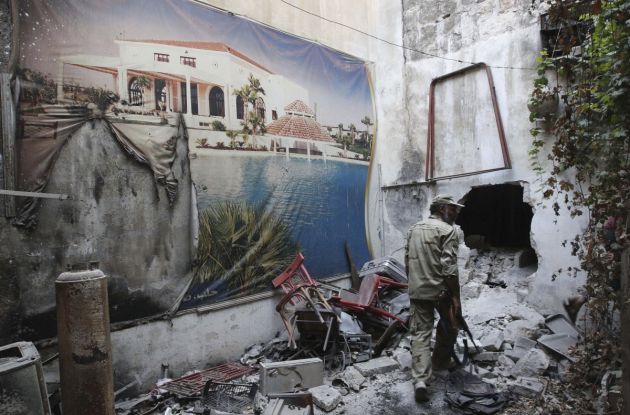World church leaders warn West on attacking Syria over chemical attack

Church leaders from around the world are urging the major global powers not to rush into an attack on Syria to punish it following an alleged chemical attack last week by the regime of Bashar al-Assad that killed hundreds of people.
Catholic Bishop Antoine Audo of Aleppo in Syria on Tuesday issued a caution that foreign military action in the country could spark a global war, making the "tragic situation" much worse, Missionary International Service News Agency reported.
"The only road to peace is dialogue," said Bishop Antoine, who lives in Aleppo, one of Syria's worst affected cities in the 30 month civil war. "War will not take us anywhere.
"I have seen thousands of civilian victims of the violence," Bishop Audo said. "We are in need of someone that brings us hope for peace, not a new charge of hatred."
U.S. Secretary of State John Kerry on August 26 said it was "undeniable" that chemical weapons were used in an attack on civilians near Damascus last week.
"Make no mistake," Kerry said. "President Obama believes there must be accountability for those who would use the world's most heinous weapon against the world's most vulnerable people. Nothing today is more serious, and nothing is receiving more serious scrutiny."
The Syrian Arab News Agency, run by the government, accused Kerry of having "fabricated" evidence to sway the international community to side with rebel fighters, The Associated Press reported.
WORLD COUNCIL OF CHURCHES
In Geneva on Tuesday the general secretary of the World Council of Churches, Rev. Olav Fyske Tveit, said, "I appeal to the U.N. and international community to work cooperatively for a negotiated political means to find a peaceful end to this conflict."
Tveit pointed to a 2006 statement of the world church body at the gathering of the WCC's highest governing body, its assembly in Porto Alegre, Brazil. There churches around the world called on the international community and individual governments to protect citizens from gross human rights violations.
The Conference of European Churches, which works closely with the WCC, urged strengthened efforts at reaching agreement between the two sides of the divide in the U.N. Security Council.
"As the U.N. Security Council considers its response to this heinous act, we pray that any decision taken will primarily consider the good of the Syrian people and not the exigencies of politics," the CEC general secretary, Rev. Guy Liagre said in a statement.
"Every effort among global leaders must continue to be made to reach an enlightened consensus on how to deal with the events around the chemical attack using international law and institutions," he said.
Archbishop Mario Zenari, the Vatican's envoy in Syria said in an interview with Vatican Radio Tuesday he wanted to echo the appeal of Pope Francis to the international community to do everything in its power to help Syria find a solution to the ongoing conflict.
Zenari, apostolic nuncio in Syria said the international community has the responsibility to respond to the crisis as he urged, "those who have responsibility in this field - the international community, its leaders - be endowed with wisdom and with prudence."
In Britain, the Archbishop of Canterbury, Justin Welby, warned British lawmakers who were to debate the chemical attack not to rush any decision.
In an interview with the Telegraph newspaper Wednesday Welby said, "The things which MPs [Members of Parliament] will have to bear in mind in what is going to be a very, very difficult debate is firstly: are we sure about the facts on the ground?
"Secondly: Is it possible to have a carefully calibrated response including armed force, if you are sure about the facts on the ground, that does not have unforeseeable ramifications across the whole Arab and Muslim world?"
He said the consequences of military action across the Muslim world were unpredictable with the impact on those not directly involved in fighting "beyond description and horrible."
The Stop the War Coalition in the UK called a protest in London's Downing Street, where the prime minister lives, on Wednesday against Western military intervention in Syria. It also organized another protest in Edinburgh.
The Coalition declared, "Britain, France and the United States are committing to another disastrous military intervention. Apart from the inevitable casualties, any attack on Syria can only inflame an already disastrous civil war and would risk pulling in regional powers further.
"Most people in this country have learnt from the disasters of Iraq, Afghanistan and Libya. According to a Telegraph/YouGuv poll on Sunday only nine percent of the British public would support troops being sent to Syria, and only 16 percent support sending more arms to the region.
"Our politicians, however, have learnt nothing. We need the maximum level of protest to stop them plunging us in to yet another catastrophic war."